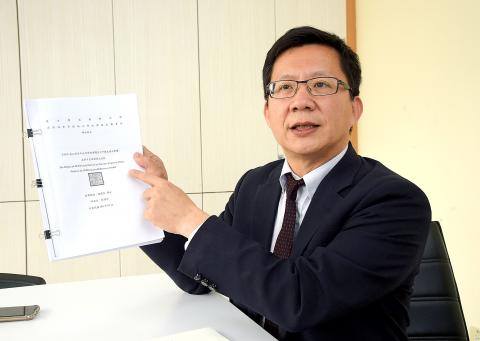Following a conflict-of-interest controversy surrounding the election of National Taiwan University (NTU) president-elect Kuan Chung-ming (管中閔), the Ministry of Education yesterday said it has again ordered the university to clarify the matter following requests from the Control Yuan and lawmakers.
A 21-member committee elected Kuan on Jan. 5. However, it was later revealed that Kuan was an independent director of Taiwan Mobile and company vice chairman Richard Tsai (蔡明興) was a committee member.
Kuan failed to disclose his connection with Tsai prior to the election, and Tsai did not recuse himself from the election.

Photo: Huang Yao-cheng, Taipei Times
The alleged conflict of interest prompted the Democratic Progressive Party caucus to issue a resolution yesterday demanding that the ministry “halt the appointment until the questionable [practice] involved in the selection of NTU’s president is investigated.”
Kuan is scheduled to take office on Thursday next week.
Asked if Kuan’s inauguration might be delayed, Department of Personnel Director Chen Kun-yuan (陳焜元) said the ministry “does not want any delay in the [inauguration] process and NTU has been urged to make an immediate response.”
The ministry has a standard procedure to deal with the controversial election of university presidents, he said.
That procedure was followed after the election in October last year of National Yang-Ming University president Steve Kuo (郭旭崧), whose eligibility was questioned as he was an associate professor instead of a professor, Chen said, adding that the university was asked to clarify the eligibility criteria and selection process.
Ordered by the ministry earlier this month to clarify the situation, the NTU committee on Jan. 11 said no rules were broken in the election.
As the Control Yuan on Monday ordered the ministry to probe the scandal, it has reissued the order to the committee.
“NTU has to respond to the issue in an appropriate manner,” Chen said.
Committee spokeswoman Yuan Hsiao-wei (袁孝維) reiterated the Jan. 11 statement, saying that there was no condition that would disqualify Tsai as a committee member.
As a secret ballot was used for the election, comments about committee members’ votes were purely conjecture, Yuan said.

A Taiwanese software developer has created a generative artificial intelligence (AI) model to help people use AI without exposing sensitive data, project head Huang Chung-hsiao (黃崇校) said yesterday. Huang, a 55-year-old coder leading a US-based team, said that concerns over data privacy and security in popular generative AIs such as ChatGPT and DeepSeek motivated him to develop a personal AI assistant named “Mei.” One of the biggest security flaws with cloud-based algorithms is that users are required to hand over personal information to access the service, giving developers the opportunity to mine user data, he said. For this reason, many government agencies and

The National Fire Agency on Thursday said a series of drills simulating a magnitude 8.5 earthquake would be held in September to enhance the government’s emergency response capabilities. Since earthquakes cannot be predicted, only by continuously promoting disaster prevention measures could Taiwan enhance its resilience to earthquakes, agency Director-General Hsiao Huan-chang (蕭煥章) said in a news release. The exercises would be held to mark annual National Disaster Prevention Day on Sept. 21, the aim of which is to test Taiwan’s preparedness and improve its earthquake resilience in case of a major temblor, Hsiao said. As part of those drills, an earthquake alert would

DEFENSE: The National Security Bureau promised to expand communication and intelligence cooperation with global partners and enhance its strategic analytical skills China has not only increased military exercises and “gray zone” tactics against Taiwan this year, but also continues to recruit military personnel for espionage, the National Security Bureau (NSB) said yesterday in a report to the Legislative Yuan. The bureau submitted the report ahead of NSB Director-General Tsai Ming-yen’s (蔡明彥) appearance before the Foreign and National Defense Committee today. Last year, the Chinese People’s Liberation Army (PLA) conducted “Joint Sword-2024A and B” military exercises targeting Taiwan and carried out 40 combat readiness patrols, the bureau said. In addition, Chinese military aircraft entered Taiwan’s airspace 3,070 times last year, up about

STRICTER ENFORCEMENT: Taipei authorities warned against drunk cycling after a sharp rise in riding under the influence, urging greater public awareness of its illegality Taipei authorities have issued a public warning urging people not to ride bicycles after consuming alcohol, following a sharp rise in riding under the influence (DUI) cases involving bicycles. Five hundred and seven people were charged with DUI last year while riding YouBikes, personal bicycles, or other self-propelled two-wheelers — a fourfold increase from the previous year, data released by the Taipei Police Department’s Traffic Division showed. Of these, 33 cases were considered severe enough to be prosecuted under “offenses against public safety,” the data showed. Under the Road Traffic Management and Penalty Act (道路交通管理處罰條例), bicycles — including YouBikes and other